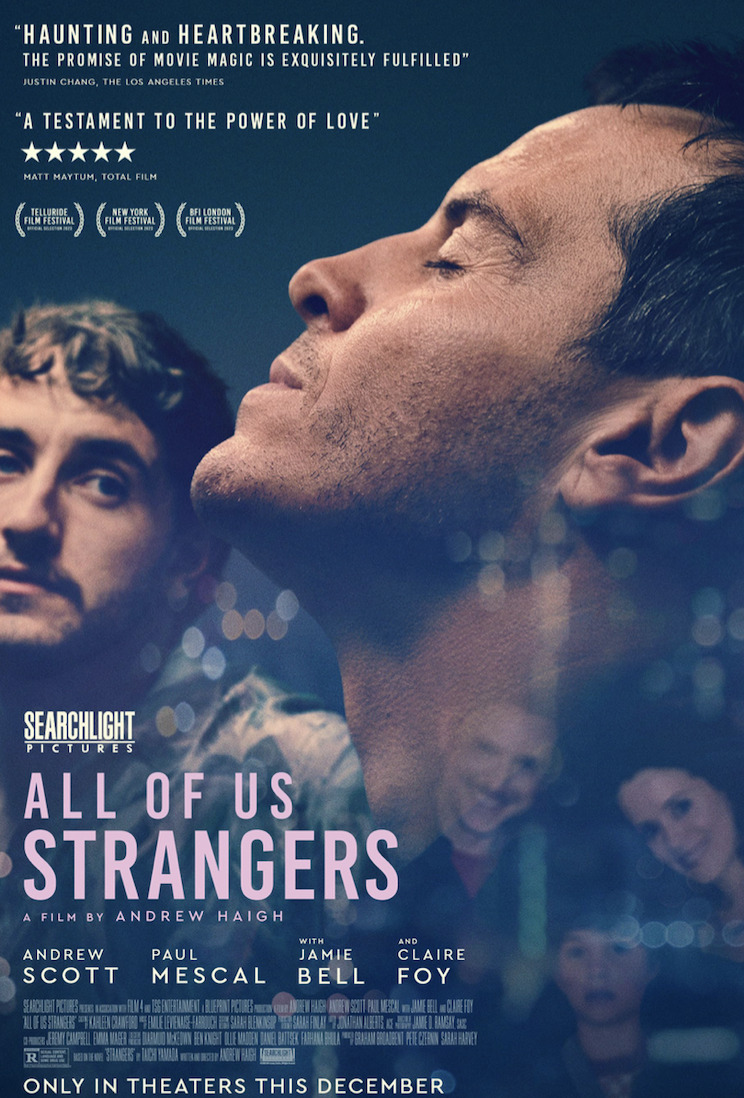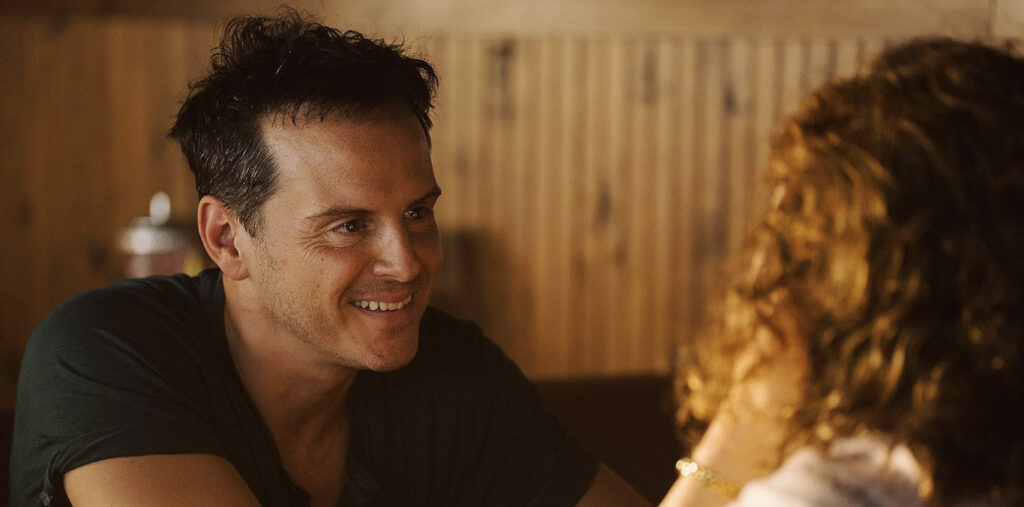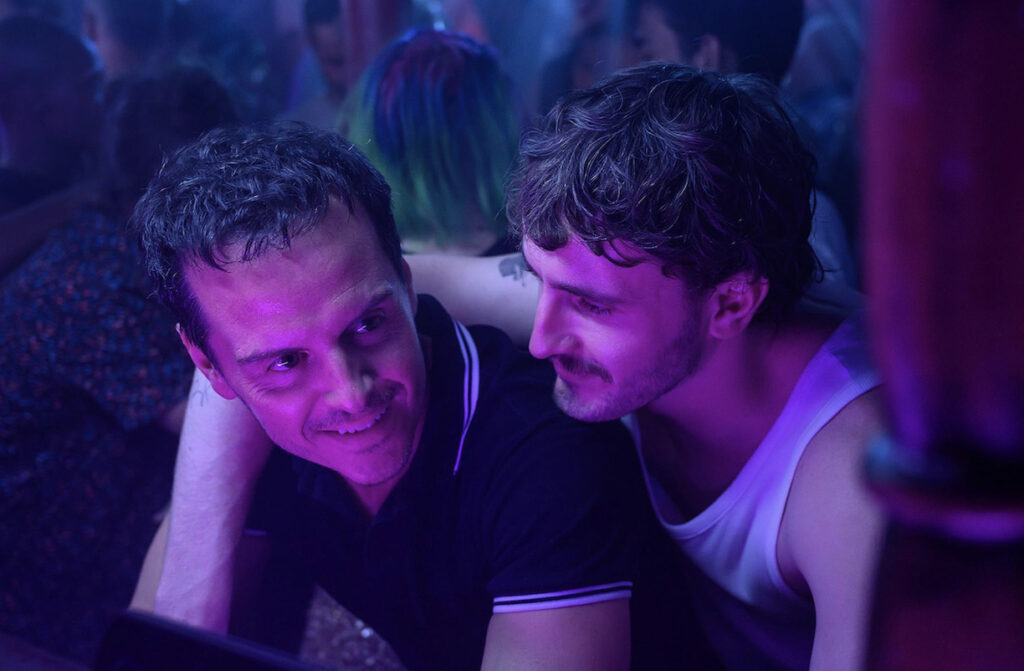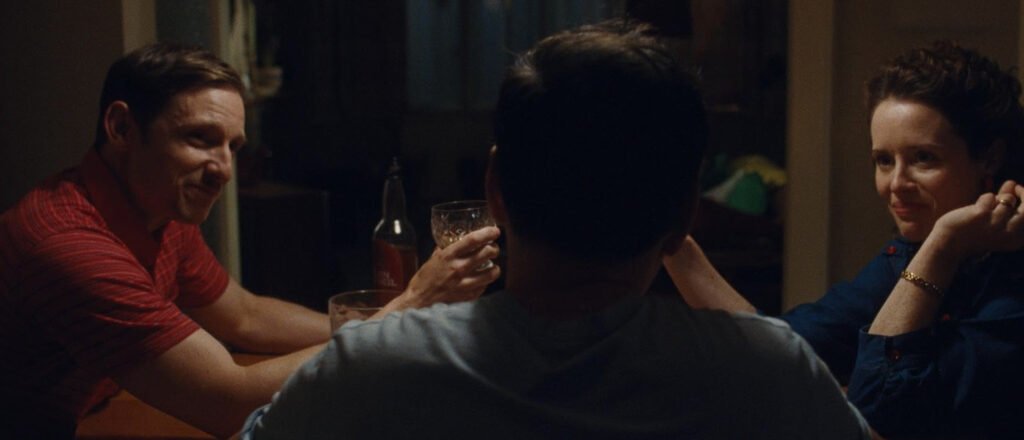
When you lose a parent there’s a lasting feeling of void and regret. About what you didn’t do, say, or hear them say. In “All of Us Strangers” a Londoner gets the second chance nobody gets. He reconnects with his dead parents in the 80s. The tone of what will come is set in the first scenes.
Adam (Andrew Scott, the priest in “Fleabag”) is a screenwriter with wounds from the past, a 40 something gay man who seems estranged from the world and someone who has never really been in love. Instead of working, he looks out at a lyrically blue London skyline from his stylish apartment in a newly built high rise.
The video of Frankie Goes to Hollywood’s “The Power of Love” is playing on the screen, his Chinese leftovers seem uneatable, and his face is melancholic. He falls asleep on the sofa. After being woken up by fire sirens he finds himself standing outside looking up at his enormous building. There is a light on in one apartment and a silhouette of a man. Harry, played by a shaggy and charming Paul Mescal and who is apparently the only neighbor in the building, will shortly after knock on his door flirting, half-smashed with a whisky bottle in his hand. Adam doesn’t invite him in, but he is drawn to his magnetic smile, like a moth to a flame. It is the spark to ignite a passionate love affair.

British filmmaker Andrew Haigh makes something completely new while still swimming in similar waters as “Weekend”, his breakthrough 2011 film. Just as that acclaimed prize-winning romance, the film also depicts an emotional, intimate, and erotic connection between two very different men while processing the identity of being gay. Loosely adapting Japanese Taichi Yamada’s novel “Strangers” from 1987, Haigh makes the story personal by changing the main character’s sexuality, taking away the son and setting it in today’s world.
As in Nottingham based “Weekend”, also taking place a lot in a high-rise building, “All of Us Strangers” is relatable to anyone who has experienced the ups and downs of new romantic love. Haigh believes that underneath the surface people can relate to their look for connection and intimacy and what they want from the world. Just as relatable is “45 Years” (2015), with Charlotte Rampling and Tom Courtenay, which depicts a straight couple who’ve been married for 45 years.
Whether it’s “Weekend”, “45 Years” or “All of Us Strangers”, Haigh is true to the two main characters in the relationship, and to what they mean to each other. One thing that strikes you in “All of Us Strangers” is the chemistry between Scott and Mescal. It’s alive, it’s flesh – they are outstanding. Scott carries the wound on his shoulders with grace, Mescal charms and seduces with his ambiguity.
They transcend the atmospheric mood contrasting the realism of “Weekend”. But the even fresher part of “All of Us Strangers” is the parallel story in which Haigh retained Yamada’s book’s metaphysics.

Adam is drawn to his childhood home. During a visit to the suburb where he grew up, he stumbles upon a man that Haigh sets up as gay cruising ground pickup. But it’s his father (Jamie Bell). He brings a surprising Adam back to the house where his mother (Claire Foy, wonderful) awaits. The parents, who shower him with unconditional love, are the same age as their son – “You were just a boy. Now you’re not” the mother notes. The three finally get a chance to talk about what has been denied them. Adam comes out as gay – “they say it’s a very lonely kind of life” the mother worries. The father is more accepting about it. Adam hears how he was as a child – “you always ran away”, “you were always a sensitive boy”. The scenes are strong and emotional and sometimes funny such as one involving reddish pajamas.
Some would argue that Haigh, who is shaped by the cinema of Kelly Reichardt, Robert Bresson, Nuri Bilge Ceylan, Michelangelo Antonioni and Lynne Ramsey, blends a love story and a ghost story together. Yet he doesn’t really go into the supernatural and turns his focus to more dramatic, spiritual, and emotional grounds. The cinematography by Jamie Ramsay (“Living”, 2022) creates a dreamlike, atmospheric, and stylish universe with lots of tense close ups and seductive imagery.
Adam seems to have fever dreams.
What we see could be those dreams or the result of a creative mind, making all an ideal illusion in his head. Just as it was suggested in Francois Ozon’s “Swimming Pool” from 2003 (perhaps Charlotte Rampling was alone in the house the whole time). Adam does wake up numerous times and has never been able to grieve properly.
He could be projecting how his parents would be, who he himself wants to be and how he wants the situation to be. Perhaps the unspoken grief can now be healed. They are strangers no more.
A melancholy flame glows throughout the film and the nostalgic music emphasizes Adam’s longing for a lost time. Classics from the 80s accompanied us: Alison Moyet’s “Is This Love?”, Pet Shop Boys’ “Always on My Mind”, Fine Young Cannibals’ “Johnny Come Home” and The Housemartins’ “Build” but above all Frankie Goes to Hollywood’s “The Power of Love” whose mood and energy Haigh somehow merged into the imagery. Even parts of its spiritual video. Nothing makes sense in grief, loneliness, and love. It’s untouchable. This film will protect you from the hooded claw.
Grade : A-

Check out more of Niclas’ articles.
Here’s the trailer of the film.

